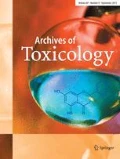Events related to the publication of the article by Hengstler (2018) and Greim (2018) make sad reading for anyone who has believed that a progressive, healthy and safe society depends for its continuing development to a considerable extent on the rational application of science. Data obtained by the scientific method is of a different kind from that which depends on opinions honed by prejudices, using prejudice here to mean a bias that may be favourable or unfavourable to a particular viewpoint. The conviction that opinions cannot be based on independent thought has led to a disregard of professionalism and the development of the view that your opinion may be varied, depending on who has asked for it. This is relativism, which embodies the assertion that knowledge is relative and that ethical truths depend on the individuals and groups holding them—there are no absolutes.
Regulatory toxicology is beset, like all science, by uncertainties including its reproducibility and the predictive value of models (Berry 2010, 2014), problems acknowledged by many (see, for example, Hartung 2009). As an indicator of the decline of enlightenment values, Kuntz, in an EMBO report in 2012 wrote … “environmental organisations at large have a vested interest in teaming up with a postmodernism view of science ….. the aim is to attack the science that stands against their agenda”. A cowardly acquiescence which ignores this stance and fails to defend a methodology that has produced so many benefits for society is shameful.
For the complex evaluations necessary to evaluate risks, individuals with many years of demonstrably sound science and good judgement behind them are an essential component of any process which seeks to minimise potential harm from new developments, without stifling the advance of the many processes on which mature societies depend. This demands not only scientific competence, but the willingness to promote scientific conclusions that disagree with the agenda of powerful interest groups. Preemptive obedience to dogma is not acceptable to any scientist.
Recently, the German Research Foundation (DFG) excluded Prof. Helmut Greim from the MAK commission, a scientific organization focussing on chemical risk assessment. The background to this action appears to be a media frenzy relating to Prof. Greim’s publications on glyphosate, where he concluded—in agreement with many regulatory authorities—that the compound is not a carcinogen. The removal of a scientist from a post as a result of media campaign is foolish, especially since the support of a competent and experienced expert such as Helmut Greim is invaluable.
References
Berry C (2010) Relativism, regulation and the dangers of indifferent science. Toxicology 267:7–13
Berry C (2014) Reproducibility in experimentation—the implications for regulatory toxicology. Toxicol Res 3:411–417
Greim H (2018) My experiences with the MAK Commission: a response to a recent editorial. Arch Toxicol Oct. https://doi.org/10.1007/s00204-018-2343-4. ([Epub ahead of print])
Hartung T (2009) Toxicology for the Twenty-First Century. Nature 460:208–2012
Hengstler JG (2018) The MAK-commission: finding solutions to society’s future challenges. Arch Toxicol 92(11):3247–3249. https://doi.org/10.1007/s00204-018-2313-x. (Epub 2018 Sep 24)
Kuntz M (2012) The postmodern assault on science. If all truths are equal, who cares what science has to say? EMBO Rep 13(10):885–889. https://doi.org/10.1038/embor.2012.130
Author information
Authors and Affiliations
Corresponding author
Ethics declarations
Conflict of interest
Sir Colin Berry has acted on behalf of UK and International regulatory authorities and has been consulted by Monsanto, Syngenta and a number of pharmaceutical companies.
Rights and permissions
About this article
Cite this article
Berry, C. The dangers of preemptive obedience to political pressure and media campaigns in science. Arch Toxicol 93, 209 (2019). https://doi.org/10.1007/s00204-018-2363-0
Received:
Accepted:
Published:
Issue Date:
DOI: https://doi.org/10.1007/s00204-018-2363-0

